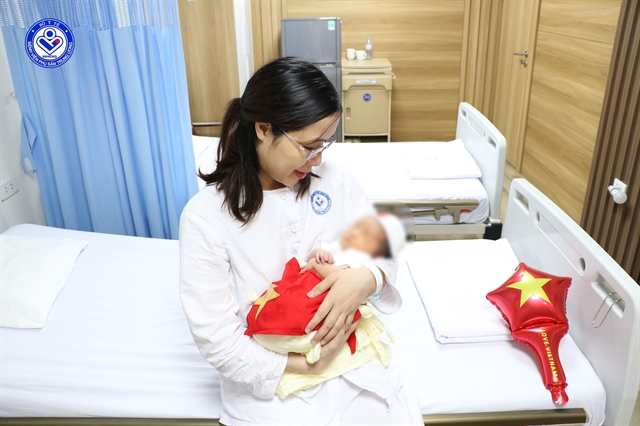 Society
Society


|
| V.A. and her newborn daughter at the National Hospital of Obstetrics and Gynaecology. — Photo courtesy of the hospital |
HÀ NỘI — A remarkable milestone in reproductive medicine has been reached at the National Hospital of Obstetrics and Gynaecology in Hà Nội, with the birth of a healthy baby girl from an embryo preserved in frozen storage for 11 years.
The newborn, weighing 3.3kg, arrived on August 22 following a successful embryo transfer on the first attempt. The mother, a 36-year-old woman identified by her initials V.A., first underwent in vitro fertilisation (IVF) at the hospital’s National Centre for Reproductive Support in 2014.
After the birth of her first child, she chose to preserve the remaining embryos, hoping to expand her family when the time was right. Returning to the centre in January 2025, V.A. had concerns due to her age, a previous complicated pregnancy, and a genetic condition – thalassaemia.
“I was reassured that the embryo would still be in good condition if stored properly. I felt more at ease and decided to embark on this new journey,” she said.
Following thorough consultation and examination, doctors transferred a single embryo, resulting in a successful pregnancy on the first attempt—surpassing all expectations.
National Hospital of Obstetrics and Gynecology Professor Dr Nguyễn Duy Ánh, who personally supervised the case, said: “This is not just an ordinary clinical case but proof of Việt Nam’s medical capacity to preserve and transfer embryos over the long term.
"The embryo, thawed after 11 years, still maintained its full quality. This demonstrates the high reliability of the storage system and brings great hope to families facing difficulties on their path to parenthood.”
The National Centre for Reproductive Support currently stores hundreds of thousands of embryos using advanced, internationally standardised technology. Post-thaw survival rates are reported at 99 to 100 per cent, allowing women to freeze embryos during their younger years and carry pregnancies later in life.— VNS




